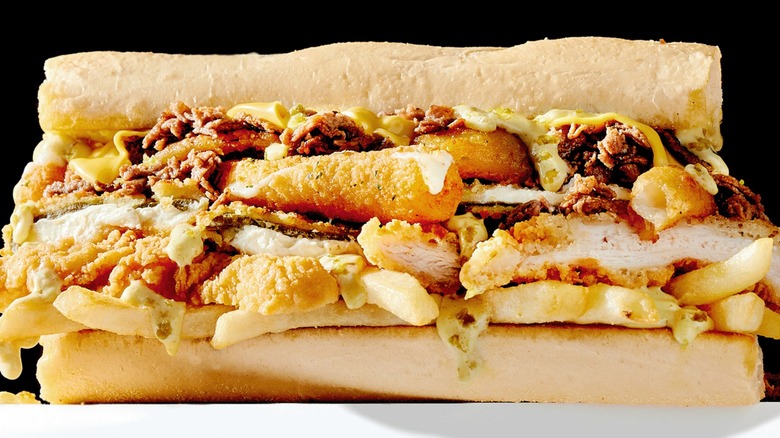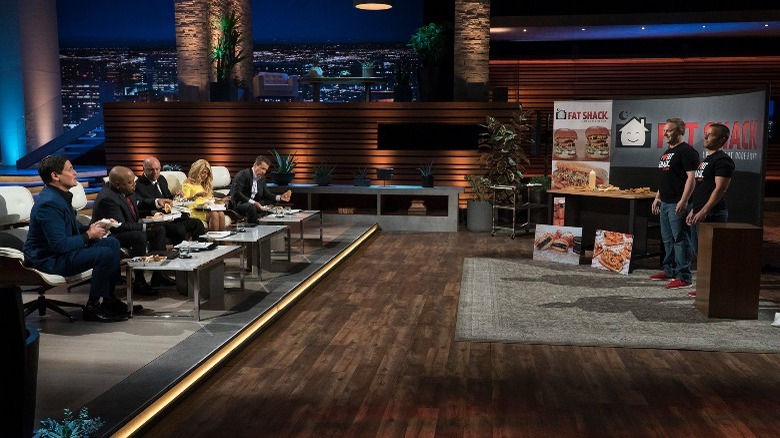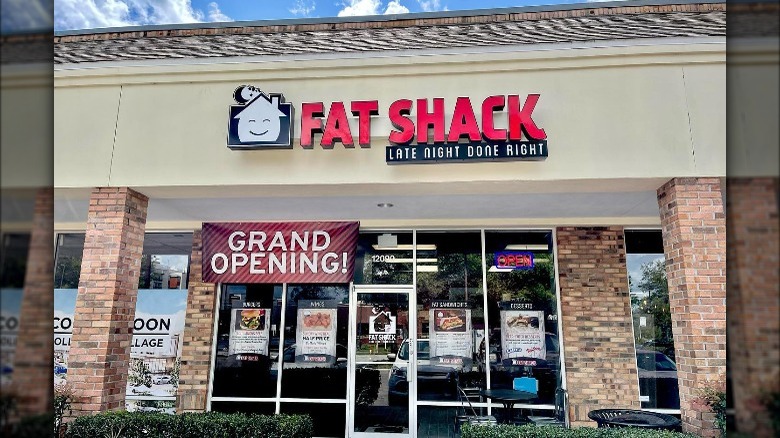What Happened To Fat Shack After Shark Tank?
According to Food Dive, the pandemic has caused Americans to be more critical of the foods they are eating and search for healthier options. In fact, the health food industry is expected to grow 6% year over year between 2020 and 2024, per Business Wire. Despite this growing focus on health, people still love a good cheat meal every once in a while, otherwise, state fairs wouldn't exist.
The founder of Fat Shack, Tom Armenti, noticed a lack of late-night, indulgent food neighboring his alma mater, The College of New Jersey, so he decided to sell massive sandwiches filled with fried food out of a local bagel shop after it closed. Late-night "grease trucks" were already commonplace in New Jersey, so The Fat Shack fit right in as the perfect midnight snack (via QSR). Although sharing the bagel shop saved Armenti a lot of start-up costs, as the business grew, he knew it could stand on its own.
The first Fat Shack opened in August 2011 in Fort Collins, Colorado, and Armenti brought his college friend Kevin Gabauer on board to help with operations. The pair was able to streamline the menu and open its first franchise in 2015 in Denver. The business continued to grow and by the time the pair appeared on "Shark Tank" in 2019, the fast-casual brand had 11 locations (via Shark Tank Blog).
What the sharks thought of Fat Shack
It's no secret that restaurants are a risky investment, with 60% of them closing within the first year and only 20% making it to five years (via CNBC). However, when Fat Shack appeared on "Shark Tank," they not only had a fun concept but the numbers to back it up. According to Shark Tank Blog, when Fat Shack appeared on the Season 10 finale of "Shark Tank," the business boasted $22 million in lifetime sales and 11 total locations, nine of them being franchises.
Co-founders Tony Armenti and Kevin Gabauer had an engaging presentation, skillfully stuffing nearly every fried food under the sun into a single sandwich (via YouTube). The pair sought $250,000 for 7.5% equity, and several Sharks took a bite, especially after trying the sandwiches. Mr. Wonderful, Daymond John, Robert Herjavec, and Mark Cuban all made offers, asking for between 17% and 25% equity in the business (via Shark Tank Blog). Even though Mark Cuban was hesitant to jump in because he has a history of investing in healthy foods, he ended up sealing the deal at $250,000 for 15% equity (via QSR).
Where are they now?
According to QSR, the reason the founders of Fat Shack made a deal with Mark Cuban in particular is because of his connections in Texas, which is where the company was looking to expand. Co-founder Kevin Gabauer told QSR that Mark Cuban is quite involved as an investor, attending weekly meetings and providing feedback. According to Fat Shack's official website, the restaurant now has 28 locations across the U.S. The chain's plans to use Cuban's Texas connections clearly worked because the brand has six locations in the Lone Star State.
The expansion can be partially credited to Cuban and also to the exposure from Shark Tank because 3,000 franchise requests poured in shortly after the show's air date (via Shark Tank Blog). Not only does the chain field franchise requests from outside parties, but Gabauer explained to QSR that the pair likes to promote from within, so several of the company's employees who started in the kitchen are now franchise owners. According to Shark Tank Blog, each franchise generates over $1 million in revenue per year, so Cuban is getting a nice return on his investment. The success of this chain shows that comfort food is plenty popular and with that, Fat Shack has therefore solidified itself as one of the best foods we've seen on "Shark Tank."


